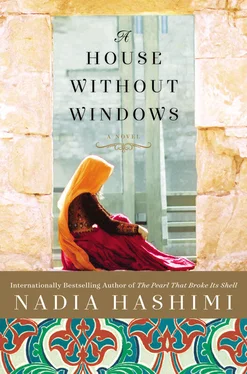Nearly every day was a sacrifice in their home.
Basir’s throat had felt thick and his hands clammy. He’d scurried off to an outhouse and emptied his stomach behind it. His father barely noticed he’d left.
Basir knew what his mother did for them. She was the reason he could laugh and eat and look after his sisters. She hid her bruises and scars.
On those days when Zeba’s resolve wore thin, she startled easily. She stared off into the fire of their clay oven in a way that made Basir nervous to leave her alone. When his father left the house, they all relaxed. When he was gone a bit too long, the house grew taut with nervous expectation.
Basir’s dilemma was that, as much as he wanted to despise his father, he still found himself drawn to him. He saw Kamal as strong and capable. He listened to his father’s stories of his own boyhood mischief, wishing time could bend and make him his father’s childhood friend. Basir compared himself to his father, wondering if his own feet would ever be so big and grounding, if his beard would be as full or if his comings and goings would be so free.
If his mother seemed to forgive his father’s outbursts, why shouldn’t he? If she’d been so upset about the kind of man he was, why hadn’t she said something? Why didn’t she ever scream out or strike back? She’d done nothing to say things should be any different. She’d always carried on as if his father had been exactly the type of husband she’d expected.
Basir hurled another rock at the stream. The fish darted back and forth in no particular direction, which angered Basir inexplicably.
He hated staying with Ama Tamina and Kaka Mateen. He hated hearing all the things people said about his mother. Each time someone proclaimed she was damned or that she should be executed, he would grind his teeth and stifle a scream.
One morning, after Kaka Mateen had left the house, Basir pulled his sisters aside.
“Don’t listen to anything you hear them saying about our mother, okay?” he whispered to Shabnam and Kareema. “They don’t know what they’re talking about. Madar- jan is going to be just fine and until she comes back, I’m looking after you all. There’s nothing to worry about.”
He said it not because he believed it, but because he believed they needed to hear it.
His sisters were young and frightened and stayed on their best behavior. Shabnam tried to look after Rima as much as she could. She was used to helping Madar- jan at home and hummed the same soothing tunes, watching lovingly as Rima’s eyelids grew heavy. Kareema kept the few clothes they’d brought neatly folded in a corner of the room they shared with their five cousins. They stayed close by Ama Tamina’s side and offered to help with whatever she was doing.
Basir sat on a flat rock and pulled his knees to his chest. The sun was sinking into a sky of purple and orange ribbons. He should be getting back before dinner or Kaka Mateen would be angry. Basir hated feeling controlled. He hated that he wasn’t allowed to visit his mother. He heard that she had a lawyer now. When he’d asked if she had gone before a judge yet, his aunt and uncle stopped talking about his mother’s case altogether. It was no use asking anything else. He would only be told what they wanted to say anyway.
As he looked at the earth under him, Basir dug his fingers into the dirt, feeling the grains embed under his fingernails and liking the way it stung. He scraped his fingers against the ground, lifting it and letting it drift through his fingers. How many handfuls of dirt covered his father?
Basir tried to picture him, his corpse sheathed in white. His uncles had insisted that he help wash his father’s body for the burial.
Kaka Fareed held nothing back.
“Look! Look what your mother’s done! This man should be alive. Your father should be standing next to me. But here I am washing his dead body because your damned mother took a hatchet to his head.”
Kamal’s eyes were shut and his jaw was closed with a strip of white cotton wrapped around his face, below his chin and knotted at the top of his head. There was contempt in the downward turn of his lips. Basir couldn’t bear to see that scorn, wondering if it was directed at his mother or at someone else. Basir had picked up his father’s hand and, feeling the stiff fingers against his own, had dropped it as one would a hot coal. He’d taken two abrupt steps backward, his father’s cousins staring at him with a mixture of disappointment and understanding. They’d said nothing when he sat slouched forward with his head in his hands.
Did my mother really do this?
He could not imagine it. Nor could he imagine another plausible explanation for the scene he’d found at home that day. The blood, the look on his father’s face, the way his mother quavered when she told him to take the girls inside.
Basir had dug a small hole, the size of an apple. He clenched his hand into a fist and pressed his knuckles into the dirt, moving his hand back and forth and letting the friction burn his skin. His chest heaved with one deep breath.
Maybe he didn’t know his mother as well as he thought he did. Maybe his father had strayed from home for a reason.
Basir’s head ached at the thought of having to choose between two parents, especially since one of them was dead. He didn’t know who to blame. All he could wish for was for his mother to stay alive.
Any parent, his mother had told him once, is better than no parent at all.
GULNAZ STRETCHED HER LEGS ON THE FLOOR CUSHION AND leaned her head against the wall. She’d spent all day avoiding everyone. She wanted to speak with Rafi, but he wasn’t yet back from town. His wife, Shokria, watched her nervously. Gulnaz scowled and kept her green eyes averted. On more than one occasion, Shokria had whispered to her sister that her mother-in-law’s emerald eyes bored into her so intensely she could feel her muscles knot.
Gulnaz knew what people thought of her. As daughter of the powerful murshid, people had always treated her with cautious respect. And when they caught a glimpse of her green eyes, she could see them hesitate to take their next breath, as if she might have cursed the very air around them. Even as a young girl, her aunts and cousins had thrown accusing looks her way when things went wrong, as if it were her fault they’d oversalted the stew or tripped on a stone in the courtyard. No one else in the family had green eyes, which made them all the more striking. By the time she was two, the family had concluded she’d been born with a twisted form of the murshid ’s powers, not the kind that drew people in hopes of blessings and good fortune, but the kind that could bring on a toothache or destroy a field of crops.
Gulnaz was an only child, another oddity attributed to her mysterious powers.
She must have cast a nazar on her mother’s womb in the nine months she was in there. Not a single child after her! Allah have mercy!
When Gulnaz was born, Afghanistan had been flirting with madness. The Soviets had just helped build an airport in Kabul. They poured money into the small country, showering her with compliments and adorning her wrists and ears with jewelry.
In hard times, when the murshid seemed to have lost his connection to the Almighty, onion fields remained fallow. Horses fell ill and died. Prayers went unanswered. Rumors spread that the murshid was a spy for outside nations. He was selling out his own Afghans, they said. He was an emissary for the Russians, the Americans, or the British, depending on who was asked, feeding them information about the local officials and the movements of the mujahideen. Any bottle of perfume, any ink pen, any nickel-plated teakettle in his home was evidence of his duplicity.
Читать дальше











